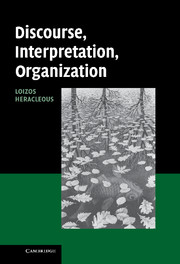Book contents
- Frontmatter
- Contents
- List of figures
- List of tables
- Preface
- 1 Images of discourse: interpretive, functional, critical, and structurational
- 2 Interpretive approaches to organizational discourse
- 3 Functional approaches: metaphor in organization change and development
- 4 Critical approaches: Michel Foucault's conceptions of discourse
- 5 A structurational approach to discourse
- 6 Analyzing discourse I: discourse as situated symbolic action
- 7 Analyzing discourse II: a tale of three discourses
- Index
- References
1 - Images of discourse: interpretive, functional, critical, and structurational
Published online by Cambridge University Press: 22 September 2009
- Frontmatter
- Contents
- List of figures
- List of tables
- Preface
- 1 Images of discourse: interpretive, functional, critical, and structurational
- 2 Interpretive approaches to organizational discourse
- 3 Functional approaches: metaphor in organization change and development
- 4 Critical approaches: Michel Foucault's conceptions of discourse
- 5 A structurational approach to discourse
- 6 Analyzing discourse I: discourse as situated symbolic action
- 7 Analyzing discourse II: a tale of three discourses
- Index
- References
Summary
The linguistic turn of the later twentieth century has led to a widespread and growing interest in discourse, both in organization studies and in the social sciences more generally. Since the late 1970s, organization scholars have began to move beyond a conception of language as a functional, instrumental conduit of information, and drew attention to its symbolic and metaphorical aspects as constructive of social and organizational reality (Dandridge, Mitroff and Joyce, 1980: Manning, 1979), constitutive of theory (Morgan, 1980, 1983), and enabling of shared meanings, co-ordinated action, and even organization itself (Daft and Wiginton, 1979; Louis, 1983; Pondy and Mitroff, 1979; Smircich, 1983). Subsequent scholars have adopted a wide range of approaches to the analysis of organizational discourses and have conceptualized discourse itself, and its relevance to organizational interpretations, actions and subjectivity, in a variety of ways (Grant, Keenoy and Oswick, 1998; Heracleous and Hendry, 2000; Mumby and Stohl, 1991; Phillips and Hardy, 2002).
Discourse analysis, in the broad sense of utilizing textual data in order to gain insights to particular phenomena, has had a rich and varied heritage in the social sciences, spanning the fields of sociology, anthropology, psychology, political science and history (OConnor, 1995), and this same richness and diversity is evident in the organizational sciences.
Information
- Type
- Chapter
- Information
- Discourse, Interpretation, Organization , pp. 1 - 27Publisher: Cambridge University PressPrint publication year: 2006
References
Accessibility standard: Unknown
Why this information is here
This section outlines the accessibility features of this content - including support for screen readers, full keyboard navigation and high-contrast display options. This may not be relevant for you.Accessibility Information
- 2
- Cited by
